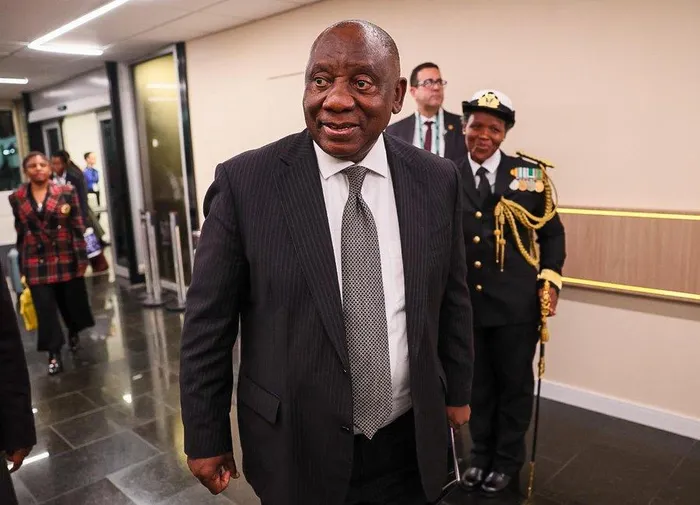South Africa faces economic turmoil as US tariffs could end Agoa's beneficial status
GLOBAL TRADE

President Cyril Ramaphosa has arrived in Brazil where he attended the XVII #BRICSSummit on 6 - 7 July in Rio de Janeiro. Ramaphosa said the 30% reciprocal tariff is not an accurate representation of available trade data.
Image: GCIS
Industry players have warned of the wide-ranging implications resulting from the hefty import tariffs imposed by the United States on the country’s products.
Beginning August 1, the Trump Administration levied a staggering 30% tariff on all South African products entering the US, potentially reversing the many benefits gained under the African Growth and Opportunity Act (Agoa).
Economists and industry leaders are concerned that this sweeping tariff policy, which applies indiscriminately to "any and all South African products," could spell disaster for key sectors reliant on the US market.
Major South African exports to the US include precious stones and metals, motor vehicles, parts and accessories; iron and steel, machinery; aluminium products, ores , organic chemicals, edible fruit, chemical products and nickel products.
This uncertainty is compounded by the impending expiration of Agoa in September, with no guarantee that Congress will renew the deal.
If the full 30% tariffs are imposed on South Africa in early August despite exclusions or reduced tariffs on metals and minerals, South Africa’s large vehicle and agricultural export sectors will come under particular pressure.
North West University Business School economist, Prof Raymond Parsons, noted the heavy economic headwind these tariffs create.
“While not unexpected, it creates a challenging economic headwind for SA. For now, the most vulnerable sectors for SA, such as agriculture and cars, remain badly affected unless last-minute negotiations can still ameliorate the situation by August 1,” Parsons said.
“It is also clear that the latest US tariff decision offsets any remaining advantages of duty-free access enjoyed so far by SA under Agoa, which in any event seems unlikely to be renewed by the US Congress later this year.”
As a preferential trade agreement meant to foster trade between the US and Africa, Agoa allows over 30 African nations to export thousands of goods to the US, granting American access to vital minerals and investment opportunities in Africa.
However, the clocks are ticking towards the agreement's potential demise, as efforts to extend it from 2025 to 2041 face uncertainty.
Bongani Mankewu, director of the Infrastructure Finance Advisory Institute (InfraFin), concurred that Agoa seemed unlikely to be renewed and called for a strategic industrialisation capacity led by the government to ensure sustainability.
“We will be punished until we realise self-sufficiency through our own industrialisation is our only option. Even the BRICS that some think is a panacea will exploit us if we don't protect our total population's interest,” Mankewu said.
“The word "autarky" don't exist in our economic lexicon. Industrialisation ought to be driven by the government through instruments like development finance institutions. Alas, institutions like the Public Investment Corporation finance consumption related businesses. You better have a warehouse to store finished products for distribution than to establish a factory for manufacturing.”
The new tariffs, which have been characterised as punitive by many stakeholders, could lead to a dramatic decline in South Africa's export capacity to the US trade relations.
President Cyril Ramaphosa said the 30% reciprocal tariff is not an accurate representation of available trade data.
“In our interpretation of the available trade data, the average tariff on imported goods entering South Africa stands at 7.6%. Importantly, 56% of goods enter South Africa at 0% most favoured nation tariff, with 77% of US goods entering the South African market under the 0% duty,” he said.
According to the Office of the US Trade Representative, US goods exports to South Africa in 2024 were $5.8 billion, down 18.3% from 2023 while US goods imports from South Africa were up 4.9% to $14.7bn during the same period.
As a result, the US goods trade deficit with South Africa was $8.8bn in 2024, a 29% increase from $2bn over 2023.
Anchor Capital analyst Casey Sprake said while a number of strategic products - such as platinum group metals (PGMs), manganese, chromium ores, and certain medical and energy-related goods - remained exempt from the higher duties, a significant portion of South Africa’s export base is directly exposed.
“We estimate that around 40% of exports to the US may avoid the 30% tariff due to exemptions, but that still leaves key sectors highly vulnerable- such as the automotive industry and agricultural exports,” Sprake said.
“While it is unlikely that South Africa will lose all access to the US market, exporters will face significantly tougher competition and thinner margins. This has the potential to undermine job creation in export-led industries and deter long-term investment, especially in manufacturing. More broadly, this development signals a deterioration in the trade relationship between South Africa and one of its largest trading partners.
BUSINESS REPORT